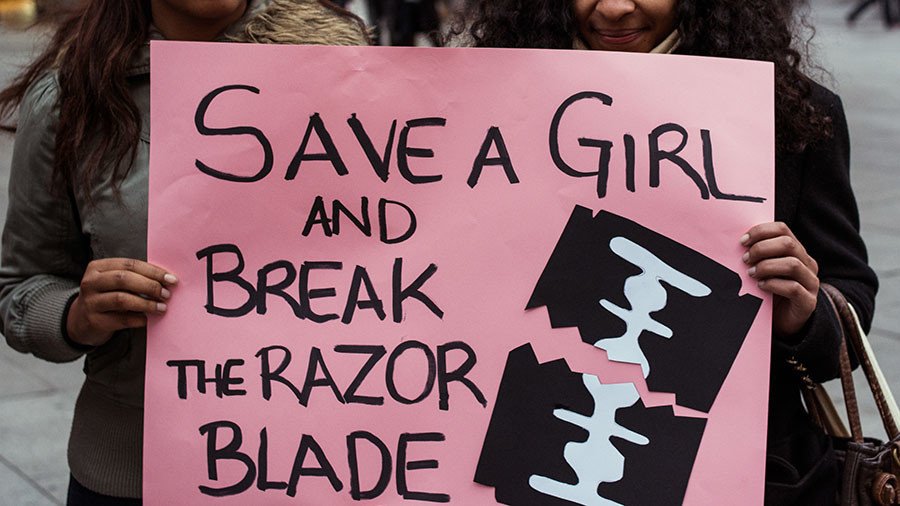Perpetrators still subjecting British girls to genital mutilation with impunity, campaigner tells RT

British children are being subjected to genital mutilation at home and abroad with impunity for the perpetrators, a campaigner has warned. Nobody would be held responsible if a girl goes missing from school, they said.
Hilary Burrage, author of ‘Eradicating Female Genital Mutilation: A UK Perspective’ told RT: “If a child doesn’t appear and she doesn’t come back, she doesn't exist anymore. Maybe she went ‘home,’ had FGM (Female Genital Mutilation) done, and she died. She’ll then just be history.”
According to figures released under Freedom of Information (FOI) laws this week, the number of reported cases of FGM has increased nearly five-fold. It is estimated there are some 137,000 girls and women living with FGM in Britain, and 144,000 girls at risk of FGM in England and Wales. It is impossible to know how many are being taken abroad for the procedure.
On International Women’s Day, Mama Silya, a victim of FGM living in north London, is calling on the UK to step up its efforts to stop the “traumatic” practice. She said the UK is only interested in trying to tackle FGM in countries it has colonized. “They are not talking to everyone, but just going to some places, which is not fair. Don’t just look to the Commonwealth countries. Look at other places where these children are at risk. Every girl is cut there, it’s happening daily.”
Silya is herself a victim of FGM. Some 27 years ago, aged 10 in her home country of Guinea, she was held down by five women and stripped of her most intimate parts. She had been taken to a river so she could be washed from head to toe, and dressed in a white gown. Her hair was plaited and her hands were covered in henna patterns as she was prepared for the coming-of-age procedure.
“They took something away from me without my consent. My clitoris, my right of a woman. I was born healthy, so there is no reason for someone to come and take it away from me just because of culture or what they said,” stated Silya.
She described how she was forcibly held down. “Both women held me, one by the left hand and one by the right. The other two were holding my legs while another woman was cutting me. They cut my clitoris with blades. There was a lot of blood coming out so I lost it, I fainted.”
The mother-of-three said the women had no medical qualifications and carried out the procedure with no anesthetic. “Once I was held down, I was screaming, trying to run off, but when you are a child and four women are holding you, you cannot run. You can just scream and cry.”
FGM is a ritual procedure by which some or all of the external female genitalia are cut or removed. Depending on what type of FGM is carried out, the clitoris, and the inner and outer labia can be removed; and the vaginal opening may be sewn up. There is no medical reason for FGM, and it is not provided for in any religious text. However, communities mainly in Africa, the Middle East and Asia still consider the procedure a milestone on the path to adulthood.
Silya explained how FGM is used as a way of preserving virginity and controlling sexuality, as one’s desire for sex is subsequently lost. She said people in her community believe that “if the woman is not cut, she will have the temptation to go with men all the time.” She added: “[If] the woman is not cut, she is not clean.”
New figures released this week by the Iranian and Kurdish Women’s Rights Organization, which is based in the UK, show almost a five-fold increase in reports to police of alleged FGM. Over a three-year period between 2014 and the end of 2016, FOI responses by 47 police forces show there were 1,337 reported cases of FGM, and that they had risen from 137 in 2014 to 647 in 2016.
According to the latest data from the Crown Prosecution Service (CPS), however, there have been just 36 referrals of alleged FGM to the CPS since 2010. Despite the government having criminalized FGM in 1985, there has not been a single successful prosecution.
The first case, in 2015, saw a National Health Service (NHS) doctor acquitted in less than 30 minutes. The second case to reach trial collapsed last month after a judge ordered the jury to return a not-guilty verdict. The third case – brought by the Metropolitan Police – is set to open at the Old Bailey next week.
Burrage said the British government must now “get serious” about tackling the practice at home and abroad. She said it is difficult for authorities to track down parents who have sanctioned FGM on their daughters, as many girls do not want “to see the law involved because it would penalize their family.”
She added that some police officers are “not very well-equipped at all” to deal with FGM.
“The police are completely at a loss as some officers are still very embarrassed about talking about any female gynecology.”
Burrage believes the UK government “passes the buck,” as there is no one in Britain who can be held accountable for FGM here. “Isn’t that convenient?,” she said. “We do not have a single… person at the top of the political hierarchy who takes responsibility for what happens. Nobody is ultimately responsible.”
If you like this story, share it with a friend!
















